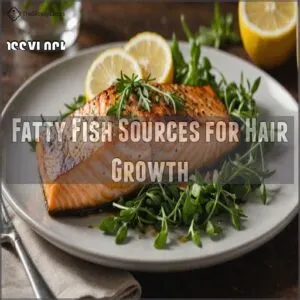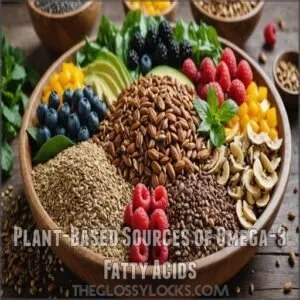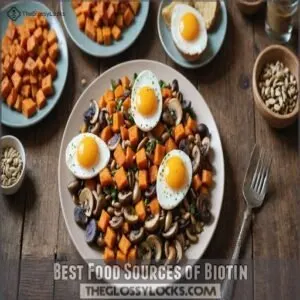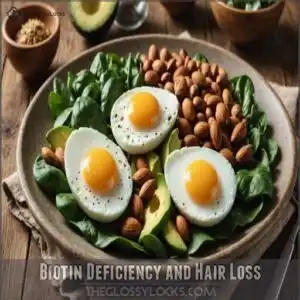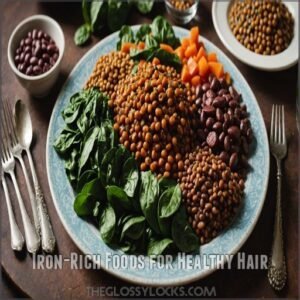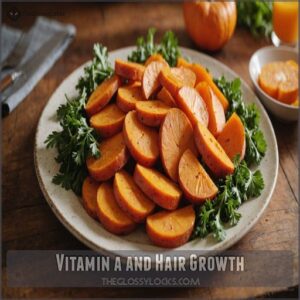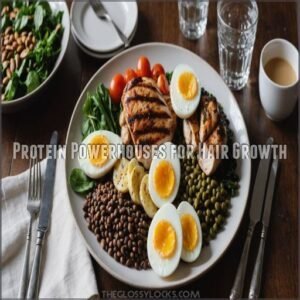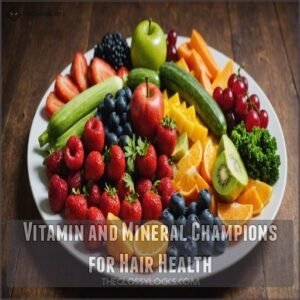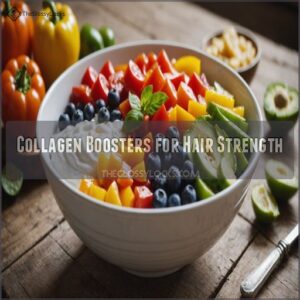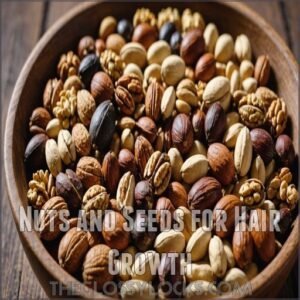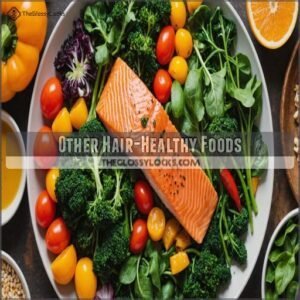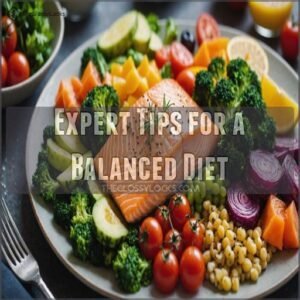This site is supported by our readers. We may earn a commission, at no cost to you, if you purchase through links.
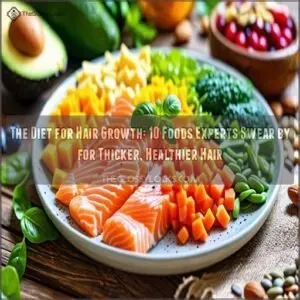 You’ll be amazed how your diet for hair growth can transform your locks from dull to dazzling.
You’ll be amazed how your diet for hair growth can transform your locks from dull to dazzling.
Start with protein-rich foods like eggs, fish, and lean meats – they’re your hair’s building blocks.
Add foods packed with biotin (think nuts and seeds), iron (leafy greens and lean beef), and omega-3 fatty acids (salmon and avocados).
Don’t forget vitamin C-rich fruits that boost collagen production and zinc-containing foods that support healthy follicles.
Just like a garden needs the right nutrients to flourish, your hair craves specific vitamins and minerals.
The secret lies in combining these powerhouse foods for maximum impact.
Table Of Contents
- Key Takeaways
- Foods Rich in Omega-3 Fatty Acids
- The Importance of Biotin for Hair Growth
- Iron-Rich Foods for Healthy Hair
- Vitamin a and Hair Growth
- Protein Powerhouses for Hair Growth
- Vitamin and Mineral Champions for Hair Health
- Collagen Boosters for Hair Strength
- Nuts and Seeds for Hair Growth
- Other Hair-Healthy Foods
- Expert Tips for a Balanced Diet
- Frequently Asked Questions (FAQs)
- What foods should I eat to promote hair growth?
- What vitamins are good for hair growth?
- Is chicken good for hair growth?
- What foods to eat for hair growth?
- What foods stop hair falling?
- How to boost hair growth?
- Which fruit is best for hair growth?
- How long does it take to see results?
- Can certain foods make hair loss worse?
- Should I take supplements with these foods?
- Whats the best time to eat for hair growth?
- Does cooking method affect nutrients for hair growth?
- Conclusion
Key Takeaways
- You’ll boost hair growth by consuming protein-rich foods like eggs, fish, and lean meats, as they provide the essential building blocks for strong hair strands.
- Your hair needs omega-3 fatty acids from salmon, mackerel, and walnuts to protect follicles from damage and increase hair density.
- You can prevent hair loss by ensuring adequate intake of biotin (from eggs and nuts), iron (from leafy greens and lean beef), and zinc (from oysters and pumpkin seeds).
- You’ll maximize nutrient absorption by combining vitamin C-rich foods with iron sources, and maintaining a balanced diet that includes both animal and plant-based protein sources.
Foods Rich in Omega-3 Fatty Acids
You’ll find nature’s best hair growth boosters in omega-3 rich foods like salmon, mackerel, and walnuts, which protect your hair follicles from damage while increasing hair density.
Research shows these healthy fats don’t just help your heart – they’re like a protective shield for your growing strands, making them stronger and thicker.
Fatty Fish Sources for Hair Growth
Want gorgeous locks? Your fish-loving friends might be onto something.
Research shows that fatty fish pack a powerful punch for hair health, thanks to their omega-3 fatty acids and essential nutrients.
If you’re not a fan of cooking fish, you can also consider supplementing with fish oil for hair growth.
Here’s what the science says about the top fish for fabulous hair:
- Salmon leads the pack with its perfect combo of omega-3s, protein, and vitamin D3
- Mackerel delivers a hefty dose of selenium and B vitamins
- Herring offers concentrated omega-3s that studies link to increased hair density
Try whipping up a simple grilled salmon with lemon and herbs tonight – your hair will thank you!
Plant-Based Sources of Omega-3 Fatty Acids
Don’t eat fish? No problem!
Your plant-based path to gorgeous hair is paved with omega-3 powerhouses.
Flaxseeds lead the pack, offering twice the omega-3s of fish oil per serving.
Sprinkle them on your morning smoothie bowl, or toss some chia seeds into your overnight oats – they’re tiny but mighty in terms of hair health.
Walnuts make the perfect hair-loving snack, while hemp seeds can transform your salads into strand-strengthening meals.
These plant champions work just as hard as their fishy friends.
The Importance of Biotin for Hair Growth
You’ll find biotin, the unsung hero of hair growth, working behind the scenes to transform the food you eat into energy that powers your hair follicles.
Your body’s crying out for this essential B vitamin, and without enough of it in your diet, you might notice your hair becoming thin and brittle – but don’t worry, we’ve got the scoop on the best foods to keep those locks looking luscious.
Best Food Sources of Biotin
Looking to boost your biotin intake naturally?
This essential B-vitamin, often called the hair growth vitamin, plays a crucial role in keratin production, which strengthening hair strands is essential for maintaining healthy hair.
Research shows it’s important for maintaining those luscious locks you’re after, with biotin deficiency potentially leading to hair loss symptoms.
Here are the top biotin-rich foods to add to your plate:
- Eggs (especially the yolks) pack a powerful biotin punch
- Sweet potatoes offer a surprisingly rich source
- Mushrooms are nature’s little biotin powerhouses
Plus, eggs and sunflower seeds make perfect biotin-boosting snacks
Biotin Deficiency and Hair Loss
Ever wondered why your hair seems to be playing hide and seek?
A biotin deficiency might be the sneaky culprit behind your thinning strands.
Here’s what you need to know about this essential B-vitamin:
Fortunately, incorporating biotin-rich foods into your diet is easier than ever, thanks to a wide range of biotin hair growth products.
Think of biotin as your hair’s best friend – when it’s missing, you’ll notice the difference.
The good news? Most cases are easily fixable with dietary tweaks.
| Symptom | Severity | Solution |
|---|---|---|
| Hair Loss | Moderate | Biotin-rich foods |
| Brittle Nails | Mild | Supplements |
| Skin Issues | Severe | Diet changes |
Iron-Rich Foods for Healthy Hair
Your hair needs iron like a plant needs water, and if you’re not getting enough of this essential mineral, you’ll likely notice your locks looking lackluster and thin.
Whether you’re a meat lover or a vegetarian, you’ll find plenty of iron-rich foods that can help your hair follicles get the oxygen they need for healthy growth.
Animal-Based Sources of Iron
While brushing with a soft-bristled brush, like boar bristle brushes, can improve blood circulation to the scalp and nourish hair follicles, biotin boosts hair growth from within, iron from animal sources acts like your hair’s personal delivery service, carrying oxygen to every follicle.
You’ll want to focus on these powerhouse options that pack the most punch:
- Red meat (especially lean beef) offers the most easily absorbed form of iron
- Organ meats like liver contain up to 3x more iron than muscle meat
- Shellfish, particularly oysters and clams, are iron goldmines
- Dark meat poultry provides a decent iron boost while being budget-friendly
Your body absorbs this type of iron more efficiently than plant sources, making these foods your hair’s best friends.
Plant-Based Sources of Iron
Regularly incorporating plant-based iron sources can revolutionize your hair growth journey.
Dark leafy greens like spinach and kale pack a serious iron punch, while also delivering vitamin C that helps your body absorb that iron more effectively.
Lentils, chickpeas, and black beans aren’t just versatile kitchen staples – they’re iron powerhouses that keep your hair follicles well-fed.
For maximum absorption, pair these foods with vitamin C-rich ingredients like bell peppers or a squeeze of lemon.
Vitamin a and Hair Growth
You’ll find vitamin A in foods like sweet potatoes and carrots, which help your hair stay healthy by producing sebum, a natural oil that keeps your scalp moisturized.
While getting enough vitamin A is important for your hair’s health, you’ll want to be careful not to overdo it since too much can actually lead to hair loss.
Food Sources of Vitamin A
Your hair’s health depends on vitamin A, which helps produce sebum – nature’s own hair conditioner.
Here’s where you’ll find this hair-boosting nutrient:
- Sweet potatoes pack a powerful punch with beta-carotene, your body’s vitamin A building block
- Carrots offer an easy-to-grab source that you can snack on anytime
- Dark leafy greens like spinach and kale double as vitamin A powerhouses
- Bell peppers bring both vitamin A and a splash of color to your plate
Think of these foods as your hair’s natural multivitamin – they’re working behind the scenes to keep your locks looking their best.
Risks of Excessive Vitamin a Intake
Even the best things need moderation – that’s definitely true for vitamin A.
Too much can backfire, leading to unexpected hair loss instead of the luscious locks you’re aiming for.
Think of it like overwatering a plant; more isn’t always better.
Studies show excessive vitamin A intake (over 10,000 IU daily) can actually trigger hair shedding, skin issues, and even liver problems.
The sweet spot? Stick to food sources rather than supplements unless your doctor specifically recommends them.
Protein Powerhouses for Hair Growth
You’ll need more than just a wing and a prayer to grow strong, healthy hair – you need protein, the building block that makes up 85% of your hair structure.
From chicken and eggs to legumes and nuts, these protein powerhouses work like tiny construction crews, supplying your follicles with the essential nutrients they need to build stronger, thicker strands.
Animal-Based Protein Sources
Looking for protein-packed foods that’ll give you that dream hair? Animal proteins are your hair’s best friends.
Eggs pack a punch with biotin and essential amino acids that strengthen each strand from root to tip.
Fatty fish like salmon doubles as a protein powerhouse and omega-3 source, while lean meats provide zinc and iron vital for hair growth.
Greek yogurt’s not just for breakfast – its protein content and probiotics support both hair strength and gut health, creating a win-win for your locks.
Plant-Based Protein Sources
Plant proteins can be just as powerful as animal sources for promoting healthy hair growth.
If you’re following a plant-based diet, you’ve got plenty of protein-rich options that’ll keep your locks looking lush.
Here are the top plant powerhouses for your hair:
- Tempeh and tofu pack 20+ grams of protein per serving
- Quinoa provides all nine essential amino acids
- Lentils offer a hearty dose of iron alongside protein
- Edamame and other soy products deliver complete protein plus biotin
These options aren’t just protein-rich – they’re versatile kitchen staples that’ll spice up your meals.
Vitamin and Mineral Champions for Hair Health
You’ll need more than just protein to keep your hair looking its best, which is why vitamins and minerals are the unsung heroes of hair health.
From vitamin C that helps your body absorb iron to zinc that keeps your scalp happy, these nutrients work behind the scenes to give you the thick, healthy hair you’re after.
Vitamin C-Rich Foods for Hair Growth
Many beauty enthusiasts don’t realize that vitamin C is your hair’s secret weapon for growth and strength.
This powerful nutrient helps your body produce collagen, which keeps hair follicles healthy and strong.
You’ll find plenty in citrus fruits like oranges and grapefruits, but bell peppers actually pack an even bigger punch.
Strawberries and kiwis are also excellent sources that’ll help prevent vitamin C deficiency.
Think of these foods as nature’s building blocks for your dream hair – they’re working behind the scenes to keep things growing strong.
Zinc-Rich Foods for Hair Growth
While vitamin C builds your hair’s structure, zinc works behind the scenes as your hair’s growth coordinator, especially since a hair growth diet for men rich in zinc can help prevent hair loss.
You’ll find this powerhouse mineral in oysters – nature’s zinc champions that pack more than your daily needs in just three pieces.
Can’t stomach oysters? No worries! Try pumpkin seeds, which make great salad toppers, or lean beef that’ll give you a healthy dose.
If you’re dealing with thinning hair, getting enough zinc might be your missing piece.
Collagen Boosters for Hair Strength
You’ll be amazed at how collagen, the protein that keeps your skin bouncy, also works wonders for your hair’s strength and elasticity.
Your body naturally produces collagen, but you can boost its production by eating foods rich in vitamin C and amino acids, like citrus fruits, bell peppers, and protein-packed Greek yogurt.
Food Sources of Collagen
Your body’s natural collagen production plays a key role in maintaining strong, healthy hair from root to tip.
Boost your collagen intake naturally with these protein-packed foods that’ll give your locks some serious love:
Incorporating protein-rich foods such as animal-based protein sources like chicken and fish can also help support hair growth.
Simmer bone broth with marrow bones for 12-24 hours to extract maximum collagen.
Choose bone-in fish like sardines and salmon, skin and bones included.
Cook chicken with the skin on and include tendons for extra collagen.
Add homemade gelatin-rich stocks to soups and sauces.
These collagen-rich foods support hair strength and elasticity.
Supplements for Collagen Production
Anyone looking to boost their collagen production naturally has several supplement options available.
Here’s a quick guide to help you choose what works best:
| Supplement Type | Daily Dosage | Key Benefits |
|---|---|---|
| Marine Collagen | 5-15g | Better absorption, sustainable |
| Bovine Collagen | 10-20g | Most studied, budget-friendly |
| Bone Broth | 8-16oz | Whole food source, minerals |
| Vitamin C | 500-1000mg | Boosts natural production |
| Biotin Complex | 2.5-5mg | Supports hair structure |
Remember to start with a lower dose and gradually increase it while monitoring how your body responds.
Nuts and Seeds for Hair Growth
You’ll find a treasure trove of hair-boosting nutrients in nuts and seeds, from biotin-rich pistachios to omega-3-packed flaxseeds.
Whether you snack on a handful of almonds or sprinkle some chia seeds on your morning smoothie, these tiny powerhouses can help you grow the thick, healthy hair you’ve always wanted.
Best Nuts for Hair Growth
Nuts pack a powerful punch in promoting hair growth.
They’re loaded with essential nutrients that keep your locks looking luscious and strong.
Think of them as nature’s tiny hair-care supplements, ready to work their magic from the inside out.
Almonds, in particular, offer numerous benefits for hair health, including almonds for hair growth.
- Walnuts lead the pack with omega-3s and biotin for stronger strands
- Almonds deliver vitamin E to protect follicles from environmental stressors
- Brazil nuts provide selenium, which supports scalp health
- Pistachios offer protein and biotin to prevent breakage
Best Seeds for Hair Growth
Looking for nature’s secret weapons for healthier hair?
Seeds pack a powerful punch.
To jumpstart healthy growth, consider incorporating hair growth seeds into your diet.
Pumpkin seeds are loaded with zinc, which helps maintain those luscious locks you’re after.
Chia and flaxseeds deliver essential omega-3s that keep your scalp happy and hydrated.
Sunflower seeds bring protein to the table, strengthening each strand from root to tip.
Don’t forget about sesame seeds – they’re rich in copper, which helps your body produce melanin for your natural hair color.
Other Hair-Healthy Foods
You’ll be amazed by how many other foods can boost your hair health, from fatty fish loaded with omega-3s to cruciferous vegetables packed with essential vitamins.
Whether you’re dealing with thinning hair or just want to maintain those luscious locks, these powerhouse ingredients will give your hair the nutrients it needs to thrive.
Fatty Fish and Omega-3 Fatty Acids
For hair growth, fatty fish like salmon and mackerel are your best friends.
Studies show that omega-3 fatty acids, abundant in these oily fish, can reduce hair loss and boost hair density.
Try whipping up a quick sardine toast with olive oil and lemon juice – it’s a tasty way to get those hair-loving nutrients.
For the best results, aim to eat fatty fish twice a week, or consider omega-3 supplements if you’re not a fan of seafood.
Cruciferous Vegetables for Hair Growth
Beyond fish oils, your hair’s secret weapon might be sitting in the produce aisle.
A well-balanced diet rich in essential nutrients is vital for the anagen phase, understanding hair growth cycles, enabling hair to grow rapidly. Cruciferous vegetables pack a powerful punch for hair health, loaded with folate and biotin that support healthy growth cycles.
Here’s what these veggie superstars can do for your locks:
- Broccoli delivers vitamin C to boost collagen production
- Kale provides iron that carries oxygen to follicles
- Brussels sprouts offer biotin for thickness and strength
- Cauliflower contains sulfur compounds that support keratin production
Try roasting them with olive oil for a hair-healthy side dish.
Expert Tips for a Balanced Diet
You’ll need more than just a single superfood to get those hair-commercial worthy locks you’ve been dreaming about.
While salmon and eggs are great for your hair, incorporating foods to eat for hair growth like leafy greens and nuts can provide essential nutrients, the real secret to thick, healthy hair lies in eating a variety of nutrient-rich foods that work together like a well-orchestrated symphony.
Avoiding Nutrient Deficiencies for Healthy Hair
Three key nutrient deficiencies can sabotage your hair growth journey.
Not getting enough iron can leave your follicles gasping for oxygen, while skimping on biotin might weaken your strands from the inside out.
You’ll want to keep your protein intake steady too – think of it as your hair’s building blocks.
And while vitamin A is essential for healthy locks, don’t go overboard – balance is key.
Track what you eat and aim for a rainbow of nutrient-rich foods on your plate.
Consulting a Healthcare Professional for Personalized Advice
How do you know if your diet’s really supporting your hair health?
While this guide offers solid nutrition tips, your unique needs might require professional guidance.
A healthcare provider or registered dietitian can create a personalized plan that considers your specific situation, including identifying essential nutrients for hair growth like protein-rich foods.
They’ll review your medical history and current medications that might affect hair health.
They can order targeted blood tests to identify nutrient deficiencies.
You’ll get customized supplement recommendations based on actual needs.
They’ll help navigate dietary restrictions while maintaining good hair nutrition.
Frequently Asked Questions (FAQs)
What foods should I eat to promote hair growth?
Want healthier, fuller hair? Pack your plate with salmon for omega-3s, eggs for biotin, dark leafy greens for iron, and nuts for zinc.
Don’t forget sweet potatoes – they’re packed with hair-loving vitamin A.
What vitamins are good for hair growth?
You’ll find essential vitamins for healthy hair growth in B-complex (especially biotin), with vitamin B5 benefits including improved hair shine and hydration. Vitamins A, C, D, and E,.
Don’t forget minerals like zinc and iron – they’re your hair’s best friends for strength and shine.
Is chicken good for hair growth?
Holy smokes, chicken’s a hair growth superhero!
It’s packed with biotin and niacin (B vitamins) that stimulate healthy hair growth.
You’ll also get protein that strengthens your strands and prevents breakage.
What foods to eat for hair growth?
Focus on omega-3 rich foods like salmon and walnuts, plus biotin-packed eggs and nuts.
Don’t forget iron-rich leafy greens and vitamin A from sweet potatoes – they’ll help your hair thrive naturally.
What foods stop hair falling?
Load up your plate with omega-3 rich salmon, iron-packed spinach, and biotin-loaded eggs.
Don’t forget nuts and seeds – they’re packed with zinc and healthy fats that’ll help keep your hair where it belongs.
How to boost hair growth?
Like a garden needing nutrients, your hair craves essential foods.
Eat fatty fish for omega-3s, eggs for biotin, and leafy greens for iron.
Don’t forget to stay hydrated and take collagen supplements.
Which fruit is best for hair growth?
Citrus fruits pack a powerful punch for hair growth with their high vitamin C content.
Citrus fruits are a great source of vitamin C, which is important for hair growth.
Berries and papaya also boost collagen production and protect your follicles from damage.
How long does it take to see results?
Rome wasn’t built in a day, and understanding that a healthy scalp care, aided by natural remedies like henna for hair growth, is essential for hair growth as it provides nourishment to the hair shafts. Rome wasn’t built in a day, and neither is healthy hair growth.
You’ll typically notice initial improvements in 3-4 months, with significant results in 6-12 months when following a proper diet consistently.
Can certain foods make hair loss worse?
Yes, excessive vitamin A, mercury-rich seafood, and foods high in sugar can worsen hair loss.
You’ll also want to watch out for processed foods that might interfere with nutrient absorption and hair health.
Should I take supplements with these foods?
While food should be your primary source of nutrients, consult your doctor before adding supplements.
They’ll help determine if you’re deficient in any vitamins and recommend the right combination for your needs.
Whats the best time to eat for hair growth?
Eating consistently throughout the day helps maintain steady nutrient levels for hair growth.
You’ll want to space your meals 3-4 hours apart, starting with a protein-rich breakfast within an hour of waking.
Does cooking method affect nutrients for hair growth?
Cooking methods can impact hair-healthy nutrients.
Steaming and quick-sautéing help retain more vitamins and minerals than boiling.
You’ll get the most benefits from lightly cooked vegetables and properly cooked proteins.
Conclusion
Like a well-tended garden, your hair thrives on the right nutrients.
Now you’ve got the scoop on the best diet for hair growth, from omega-rich salmon to biotin-packed eggs.
Remember, there’s no magic bullet – it’s about consistency and variety in your food choices.
Start incorporating these nutrient-dense foods into your daily meals, and you’ll likely notice stronger, healthier hair within a few months.
Your future self (and your hair) will thank you for making these smart dietary changes today.

